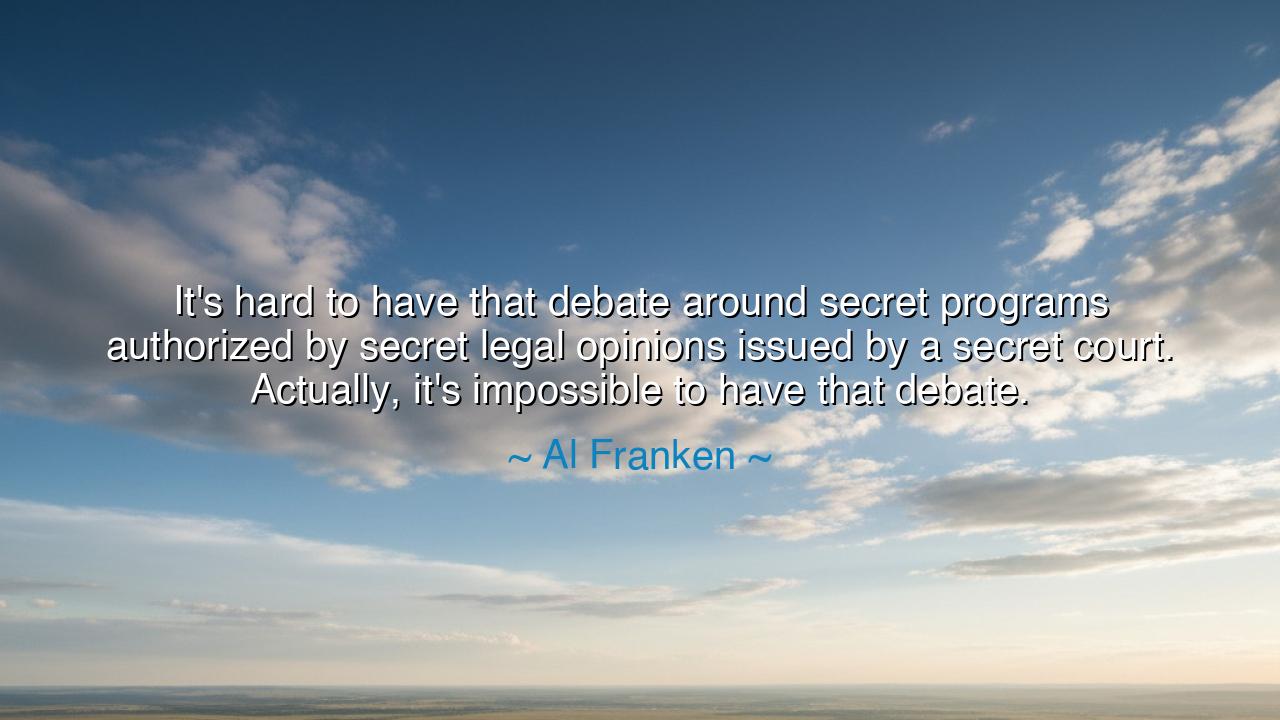
It's hard to have that debate around secret programs authorized
It's hard to have that debate around secret programs authorized by secret legal opinions issued by a secret court. Actually, it's impossible to have that debate.






In every age, there comes a moment when the guardians of power wrap themselves in secrecy, and the people are told to trust without question. It is in response to such a time that Al Franken spoke these piercing words: “It’s hard to have that debate around secret programs authorized by secret legal opinions issued by a secret court. Actually, it’s impossible to have that debate.” His words are not a mere complaint, but a lament for the death of transparency, and a warning to every generation that when justice hides behind locked doors, truth itself begins to wither. For democracy cannot breathe in the dark; it needs the light of open discourse, the air of accountability, and the warmth of truth shared among all.
The origin of Franken’s words lies in the modern struggle between liberty and security, between the open society and the secret state. In the years after the towers fell in 2001, the United States — like many nations before it — turned to the shadow for protection. Surveillance programs were built, not upon public debate, but upon classified laws and secret courts, known only to a few. Franken, a senator and advocate of civil liberties, saw what others did not dare to name: that when the law itself is hidden, the people are no longer free participants in their own governance. His words cut through the fog of bureaucracy to remind us that freedom dies not by force, but by silence — when the governed are kept from knowing what governs them.
In the ancient world, too, secrecy was the cloak of tyranny. When the Roman Republic began to crumble, the Senate passed decrees in secrecy, giving rise to rulers who claimed divine right instead of public consent. Cicero, that great defender of republican virtue, warned that a law unspoken to the people is no law at all. Franken’s words echo this ancient wisdom — that justice must not whisper behind curtains, for its strength comes from being heard and understood. A secret court may issue decrees, but without sunlight, even the noblest of intentions turn sour, and power, unchallenged, devours its own morality.
There is a profound paradox in Franken’s statement — that even debate, the lifeblood of democracy, becomes impossible under secrecy. For how can citizens argue for or against what they are forbidden to see? How can they shape the laws that bind them if those laws are written in invisible ink? In such a world, the people become spectators, not participants; subjects, not citizens. The illusion of freedom remains, but its substance fades, replaced by trust in unseen rulers and faith in unseen justice. This is the slow poison of secrecy — it destroys dialogue, and with it, the very soul of self-government.
Yet, Franken’s words are not despairing, but awakening. They remind us that secrecy must always be the exception, not the rule; that the people must reclaim their right to question, to know, to see. Just as sunlight is the enemy of corruption, so too is knowledge the antidote to fear. The history of liberty is the history of exposure — of truth brought to light against the will of those who would hide it. From the Magna Carta to the Pentagon Papers, from whistleblowers to reformers, every step toward justice has been a step out of shadow into day. For it is not secrecy that keeps us safe, but understanding.
One might recall the tale of Solon, the great lawgiver of Athens, who, when asked to draft laws for the people, insisted that every citizen must know and comprehend them. “For,” he said, “a law that hides is no law, but a trick.” His wisdom built the first stones of democracy, founded on visibility and reason. To conceal law, he believed, was to insult the intelligence of the people — and when the people are treated as children, tyranny soon follows. Franken’s call is the same: that open debate is not a luxury, but the very shield of liberty, and that a nation without it stands already conquered from within.
Let this teaching be carried forth like a torch in dark times: secrecy breeds submission; openness breeds strength. When those in power hide their actions under the veil of “security,” the people must answer with the light of inquiry. Demand to see, demand to know, demand to speak — for silence is the ally of oppression. The lesson is not that secrecy will vanish, but that it must always be questioned, tested, and contained. Justice must be visible, and the law must belong to all, not to the few.
And so, as Al Franken warns, when the world grows quiet under the weight of hidden courts and unseen edicts, it is the duty of the brave to make noise. Speak truth where silence has been enforced. Defend the right to debate, even when the subject is forbidden. For in that act lies the true spirit of democracy — not the absence of secrets, but the refusal to surrender our voices to them. Where there is secrecy, there must also be courage, and where there is courage, there will always be freedom.






AAdministratorAdministrator
Welcome, honored guests. Please leave a comment, we will respond soon